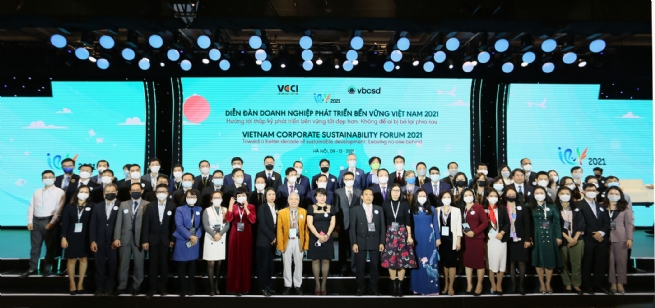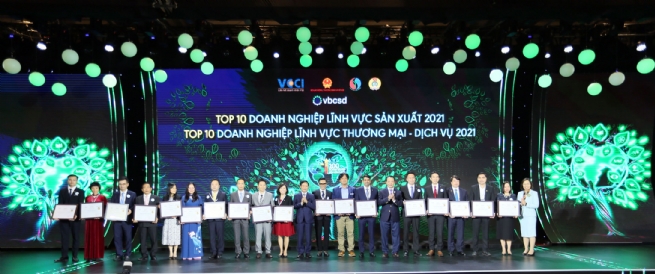6:24:18 AM | 1/28/2022
In Vietnam, "sustainable development" is a particularly important keyword in the long-term development strategy, a "green passport" for extensive economic integration into the world. Mr. Nguyen Quang Vinh, Vice President of the Vietnam Chamber of Commerce and Industry (VCCI), Executive Vice President and General Secretary of the Vietnam Business Council for Sustainable Development (VBCSD), gives an exclusive interview to our reporter on this issue. Huong Ly reports.

What do you think about the implementation of Vietnam’s Sustainable Development Goals in recent years?
Sustainable development has been integrated by the Government into the Socioeconomic Development Strategy, which emphasizes the effective mobilization of resources for sustainable development. The Government has also introduced many fundamental policies to support sustainable development, such as Vietnam's Agenda 21 (2004), Vietnam's Sustainable Development Strategy for 2011-2020 and the National Action Plan for Implementation of the 2030 Agenda for Sustainable Development with 17 Sustainable Development Goals and 115 Specific Targets set for Vietnam from now to 2030 in all economic, social and environmental fields.
Most recently, on October 1, 2021, the Prime Minister approved the National Strategy on Green Growth for the 2021-2030 period, with a vision to 2050, with ambitious goals of helping Vietnam catch up, advance together and reach aspirations for economic prosperity, environmental sustainability and social justice. This is the clearest proof that Vietnam has decided to choose to restructure the economy and change the growth model toward green growth.
The United Nations Development Program (UNDP) recently ranked Vietnam among the Top 3 countries in the world with the fastest implementation of the Sustainable Development Goals (SDGs). The UNDP SDG Report 2020 showed Vietnam's continuously rising rank in SDG in the 2016-2020 period. In 2020, the country ranked No. 49 out of 166 countries in the SDG Index, five places higher than in 2019. According to forecasts, by 2030, Vietnam is likely to achieve five out of 17 SDGs: Goal 1 on poverty eradication, Goal 2 on hunger eradication, Goal 4 on quality education, Goal 13 on climate action, and Goal 17 on global partnerships.

In particular, there have been many changes in sustainable development among the business community. In recent years, many businesses have gradually shifted their business approach and strategy from a profitable business to a responsible business. The 6th Corporate Sustainability Index (CSI) that ranks sustainability of companies in Vietnam in 2021, released by VBCSD/VCCI, showed that Vietnamese and foreign sustainable companies in the Top 10 are 55% and 45%, respectively. In the top 100, the rates are 63% and 27%, respectively.
Would you tell us the requirements for sustainable development in the new context?
In fact, carrying out SDGs in Vietnam is challenging. Financial resources for SDG implementation in Vietnam still mainly rely on governmental budget, while private and social resources are quite limited.

Besides, despite encouraging achievements in five SDGs on no hunger, zero poverty, quality education, climate action and global partnership, Vietnam still faces many difficulties and challenges to realize the remaining 12 SDGs, especially the Goal on sustainable production and consumption, and the Goal on life below water.
In the past two years, the COVID-19 pandemic has adversely impacted global social and economic life, disrupting production and supply chains, closing many service sectors, and undermining efforts of Vietnamese companies toward sustainable development. The pandemic is an important "test" to governmental agencies and sectors, especially the business community, to change their perception of crisis, thus preparing and investing, even concentrating more resources and effort to establish a risk management framework and a business continuity plan.
In addition, climate change has really become the biggest challenge to humanity. Extreme weather events and sea-level rise are seriously affecting food security, water security, sustainable development, and even threatening the survival of many countries and residential communities. Faced with these challenges, it is imperative to effectively use resources, especially applying the circular economy to production and business. At the COP26 Climate Summit, Prime Minister Pham Minh Chinh affirmed that responding to climate change and restoring nature must become the top priority in all development decisions. With the advantage of renewable energy, Vietnam will develop and implement powerful measures to reduce greenhouse gas (GHG) emissions with its own resources as well as international cooperation and support, both financially and technologically, including mechanisms under the Paris Agreement to achieve net-zero emissions by 2050.
Based on the orientation and direction of the Government, based on development practices in Vietnam as well as flexible adaptation and response to the crisis, in my opinion, in the coming time, sustainable development needs to be based on the following main objectives: Fostering digital transformation and applying new technologies; promoting circular economy and renewable energy; and sustainable corporate governance. These are also important contents in the action programs that VCCI and VBCSD have pursued, implemented and spread to the business community in recent years.
For VBCSD, how far have the goals set for the 2020-2023 term been implemented and what results have been achieved?
In recent years, VCCI and VBCSD have always directed and supported businesses to carry out sustainable development. We have worked closely with the National Council on Sustainable Development and Competitiveness Enhancement as well as central and local agencies to execute such initiatives as policy dialogue forums on sustainable development; a program on benchmarking and ranking sustainable businesses based on the CSI Index; business participation in the Green Growth Strategy as well as the High-Level Forum for Global Green Goals 2030 (P4G Forum); and circular economy initiatives.
In particular, the Program on Benchmarking and Announcing Sustainable Businesses in Vietnam (CSI Program), launched annually since 2016, is attended by a large number of businesses. Through the CSI Program, VBCSD-VCCI seeks and honors pioneers with good business practices, and encourages businesses to apply the Corporate Sustainability Index (CSI) in corporate governance to achieve sustainable business.
Recently, the 8th Vietnam Corporate Sustainability Forum (VCSF) and the 6th CSI Program Announcement Ceremony for 2021, jointly organized by VCCI and VBCSD in collaboration with relevant ministries and sectors, brought together thousands of recommendations, solutions and innovations from experts and businesses to make reports to ministries, sectors and the Government.
Would you tell us how businesses can achieve sustainable development effectively in the coming time?
In the past few years, the perception of sustainable development in the business community has completely changed. The old way of thinking that sustainable development caused businesses to increase costs and reduce profits is almost over. What is happening is proving the opposite outcome. Only sustainable development can increase business performance and reduce costs to bring higher profitability to them.
Many companies that have persistently pursued a sustainable development strategy for many years have created their own "antibodies" to the pandemic, maintained stable operations and business growth, and provided effective support for the Government, regulatory agencies and the community to realize the dual goals (pandemic prevention and economic development). Therefore, they need to focus on sustainable governance and prepare risk mitigation plans. When a crisis occurs, they can immediately start up defense and troubleshooting mechanisms to recover and develop more sustainably. When the pandemic is controlled and the economy revives, their competitive advantages built from well-trained human resources and confidence will enable them to have a solid foundation for quick recovery and return to the growth trajectory.
In addition, sustainable development will be a "green passport" for them to develop and integrate because consumers tend to shift to green, clean, organic and safe products. For example, many European countries have also decided from 2023 to impose a cross-border carbon tax on all tangible and intangible products, including software. Therefore, if they do not change their operating models nor move toward a cleaner and safer production, their competitiveness will certainly be reduced and they will have difficulty grasping development opportunities in the future.
In order to seize the opportunity to transform sustainable development models, they need to carefully study the 17 SDGs, select appropriate ones to integrate into their development strategy and apply the CSI Index to manage the business more effectively.
Currently, the CSI Index 2021 has been decentralized to suit more companies of different sizes. Once again, we want to emphasize and convey the message that sustainable development is not an unnecessary option, not a far-fetched, big thing just for big businesses, but it is really essential and tangible by the adoption of good legal frameworks. Sustainable development can be done at all levels of business
Currently, VBCSD/VCCI is coordinating with the Ministry of Natural Resources and Environment, the Ministry of Labor, Invalids and Social Affairs, the Vietnam General Confederation of Labor and some VBCSD members to further compile and complete the Industrial Park Sustainability Index in Vietnam. If each enterprise is considered a "cell" of the Vietnamese economy, promoting the formation of sustainable industrial parks will create a premise for healthy cells, and establish sustainable agencies for a powerful economic body of Vietnam.
By Vietnam Business Forum